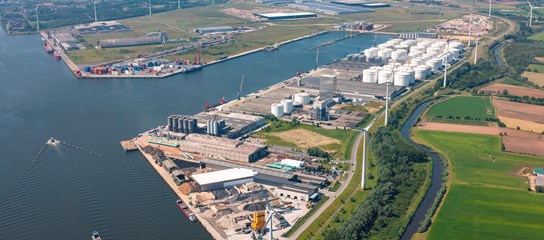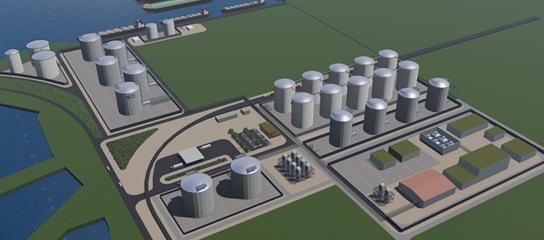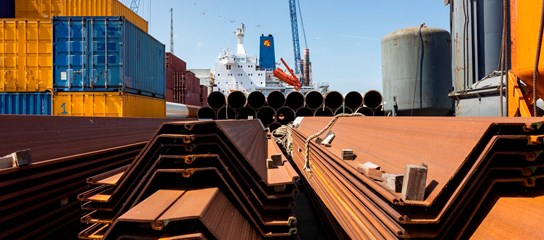Gasunie and Fluxys join forces to link Dutch and Belgian hydrogen networks in North Sea Port
Gasunie and Fluxys are working to develop national hydrogen networks in the Netherlands and Belgium, respectively. The two networks will be connected together in the port area on the Dutch-Belgian border. The link will provide hydrogen to the companies in the 60 kilometre cross-border port area: from Vlissingen and Terneuzen in the Netherlands to Ghent in Belgium. Gasunie, Fluxys and North Sea Port agreed the necessary arrangements on Tuesday 17 May.
One of Europe’s first open-access cross-border hydrogen networks
Working closely with industry, Fluxys and Gasunie are preparing to build an open-access hydrogen network on both sides of the border. Connection to the infrastructure is open to any company. The goal is to have the networks operational by 2026 and then connect them together at the border. This will mark the creation of one of the first open-access cross-border hydrogen networks in Europe.
The connection between the two hydrogen networks will be at Sas van Gent in the Netherlands and Zelzate in Belgium, where natural gas already flows between the two countries today. The pipelines for the hydrogen network will be located mainly along existing pipeline routes in order to minimise the impact on the surrounding areas.
Bringing together supply and demand
Due to its effect in increasing scale, the cross-border connection will contribute significantly to the development of the entire hydrogen value chain in the port area and the reorientation towards a green economy, as well as to securing and expanding employment. The interconnection will create an open market for green and low-carbon hydrogen throughout the port area, linking suppliers and customers in a robust whole.
The port region's connection to the national hydrogen infrastructure in the Netherlands and Belgium will also give companies access to a large hinterland, other industry clusters and ports in Europe.
International hydrogen hub
The cross-border industry cluster in North Sea Port is the largest hydrogen hub in the Benelux. 580,000 tons of hydrogen are produced and consumed by companies there every year. The demand for hydrogen in the port area will double by 2050, by which time it will be fully sustainable. The cross-border network will bring together supply and demand on a large scale, driving forward the development of the hydrogen market. North Sea Port is well located to develop an international hub function with wide international reach. This is in line with the ambitions and investments of Europe, the Netherlands, Belgium and Flanders in the energy and climate transition, and with the aim of being climate neutral by 2050.
Daan Schalck, CEO, North Sea Port: "This new cross-border hydrogen infrastructure is an additional asset that will help attract more sustainable, circular industries to the port area. Numerous hydrogen production and storage projects are planned or are already underway. Linking the two national networks in the port area is in line with our ambition for the port to grow to become a hydrogen hub on a European scale."
Pascal De Buck, CEO Fluxys: “At Fluxys, we are fully committed to helping the hydrogen market develop rapidly. The infrastructure in North Sea Port is part of our global project approach to help build the necessary decarbonisation infrastructure across Belgium and in neighbouring countries. In North Sea Port, we also have concrete proposals for the necessary infrastructure to support the capture and storage or reuse of CO2. Together with the port, industry and public authorities, we are pushing for climate neutrality."
Helmie Botter, Manager Business Development Hydrogen, Gasunie: "Gasunie is working hard to develop a national hydrogen network. Connections to our surrounding countries are a crucial part of that. This will allow the hydrogen market to really mature and help us move towards security of supply in northwest Europe."
About Gasunie
Gasunie is a European energy infrastructure company. Gasunie's network is one of the largest high-pressure pipeline networks in Europe and consists of more than 17,000 kilometres of pipeline in the Netherlands and northern Germany. Gasunie offers transport services for natural gas and green gas through its subsidiaries Gasunie Transport Services B.V. (GTS) in the Netherlands and Gasunie Deutschland in Germany. With its cross-border gas infrastructure and services, Gasunie facilitates the TTF, which has become Europe's most important gas trading point. Gasunie also offers other gas infrastructure services, including gas storage and LNG. Gasunie wants to help accelerate the transition to a CO2-neutral energy supply and believes that gas-related innovations, for example in the form of renewable gases such as hydrogen and green gas, can make a significant contribution. Both existing and new gas infrastructure are important in this regard. Gasunie also plays an active role in developing other energy infrastructure to support the energy transition.
About Fluxys
Fluxys is a fully independent energy infrastructure group with its headquarters in Belgium and a workforce of 1,300 people working in gas transport and storage and liquefied natural gas terminalling. With its affiliated companies worldwide, Fluxys operates 12,000 kilometres of natural gas pipelines and liquefied natural gas terminals with a combined annual regasification capacity of 29 billion cubic metres. One of Fluxys' subsidiaries is Fluxys Belgium (listed on Euronext), the owner and operator of the gas transport and storage infrastructure and liquefied natural gas terminalling facilities in Belgium.
As a purpose-driven company, Fluxys and its stakeholders contribute to a better world by building a bright energy future. With the unique advantages of its infrastructure and its commercial and technical expertise, Fluxys is committed to transporting hydrogen, biomethane or alternative carbon-neutral energy carriers as well as CO2, supporting its capture and reuse or storage.





